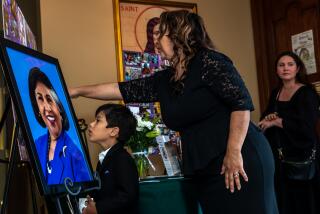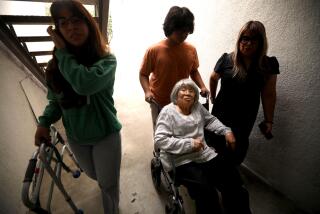Column: How do you show up en masse to celebrate Grandma’s birthday without killing her with COVID-19?
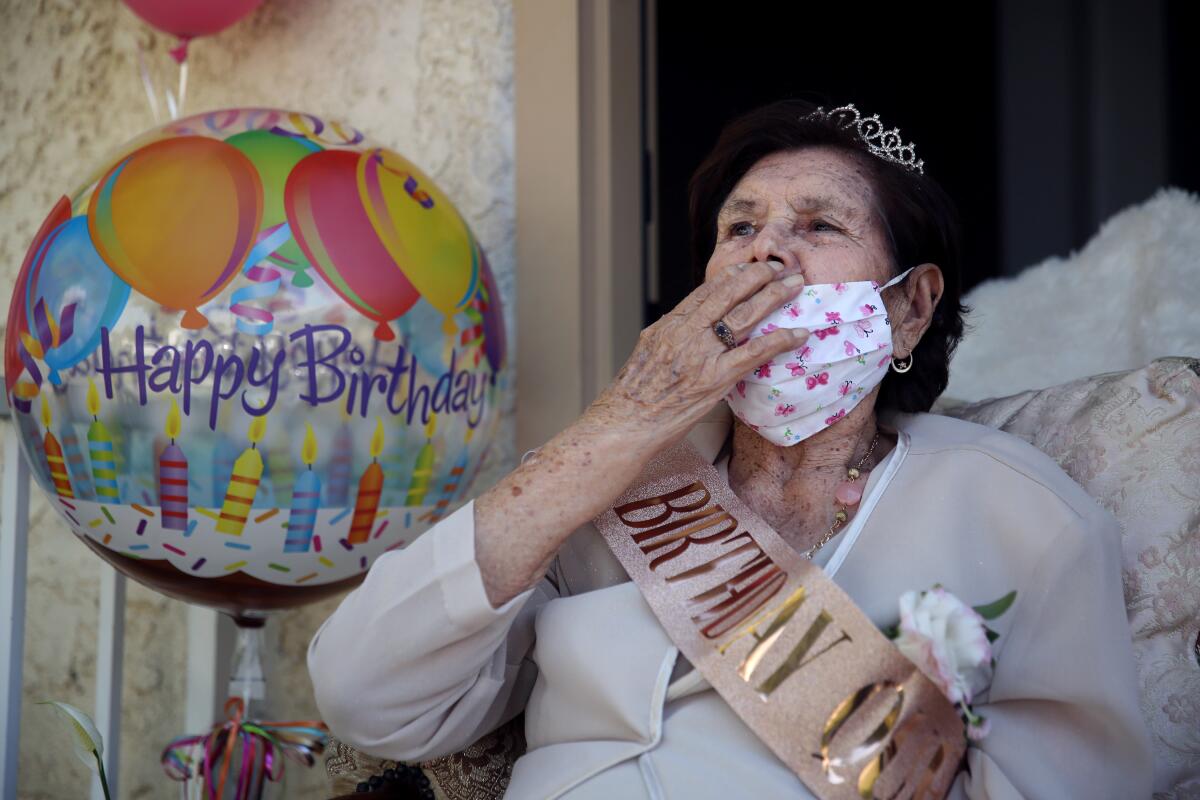
There was no question that my dad’s side of the family would celebrate the 98th birthday of our matriarch, Angelita Arellano, which happened on Oct. 1.
OK, there was one: how?
We’re a tamborazo-loving, food-crazy, hug-addicted clan where a family party of some sorts — wedding, baptism, quinceañera, or carne asada just for the hell of it — seems to happen every weekend.
But Los Angeles County, where nearly all of my dad’s side of the family lives — my siblings and I are the weirdos who ended up in Orange County — is still under strict coronavirus lockdowns, spontaneous Lakers celebrations notwithstanding. And none of us wanted to kill Grandma — which we call her as much as we do abuelita, because assimilation — after she’s lived almost a century.
So after a bunch of texts and money transfers via Venmo, a bunch of cousins decided on a plan: A socially distant fiesta that would still make the Arellanos proud.
We asked Grandma to sit on the front steps of the house of my Tia Nacha in East L.A. on Oct. 3, a Saturday. A caravan of cousins would drive by and wish her a happy birthday.
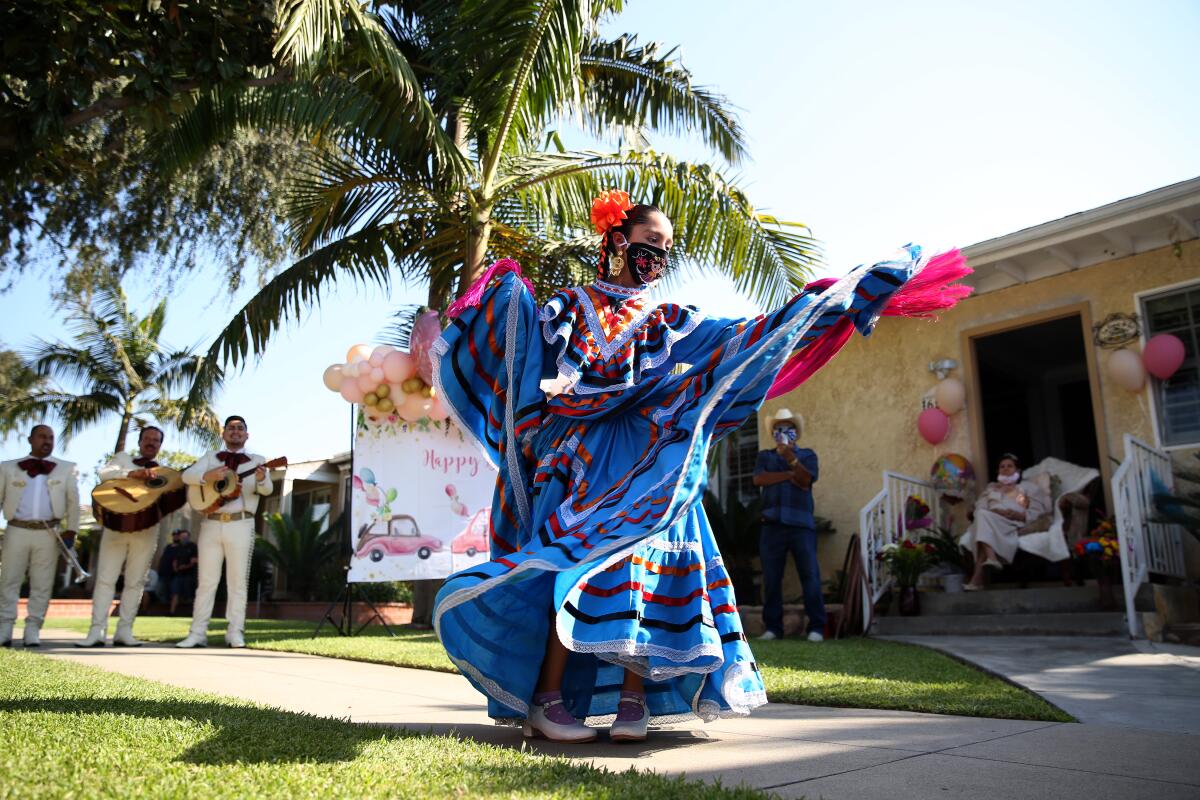
The sweltering heat didn’t keep Grandma from dressing in a matching cream-colored skirt and women’s sports coat, glittering tiara, and a ribbon that read “Birthday Queen.” Grandma looked as elegant as Britain’s 94-year-old whippersnapper of a monarch.
With a mask over her mouth, and guests off to the side six feet from each other, Grandma awaited a procession of a fraction of her eight children, 35 grandchildren, 47 great-grandchildren and 11 great-great grandchildren.
It was the first time since Christmas that so many of us had gathered in person.
“She’s had a rough few months isolated from all of us,” said Maribel Bermejo, daughter of my Tia Mela. She and her sons staked some balloons on my Tia Nacha’s front lawn and put water bottles in a cooler. “So why not celebrate her? Her health is all of our priority, but that also means to make sure she’s happy.”
The party started at 3.
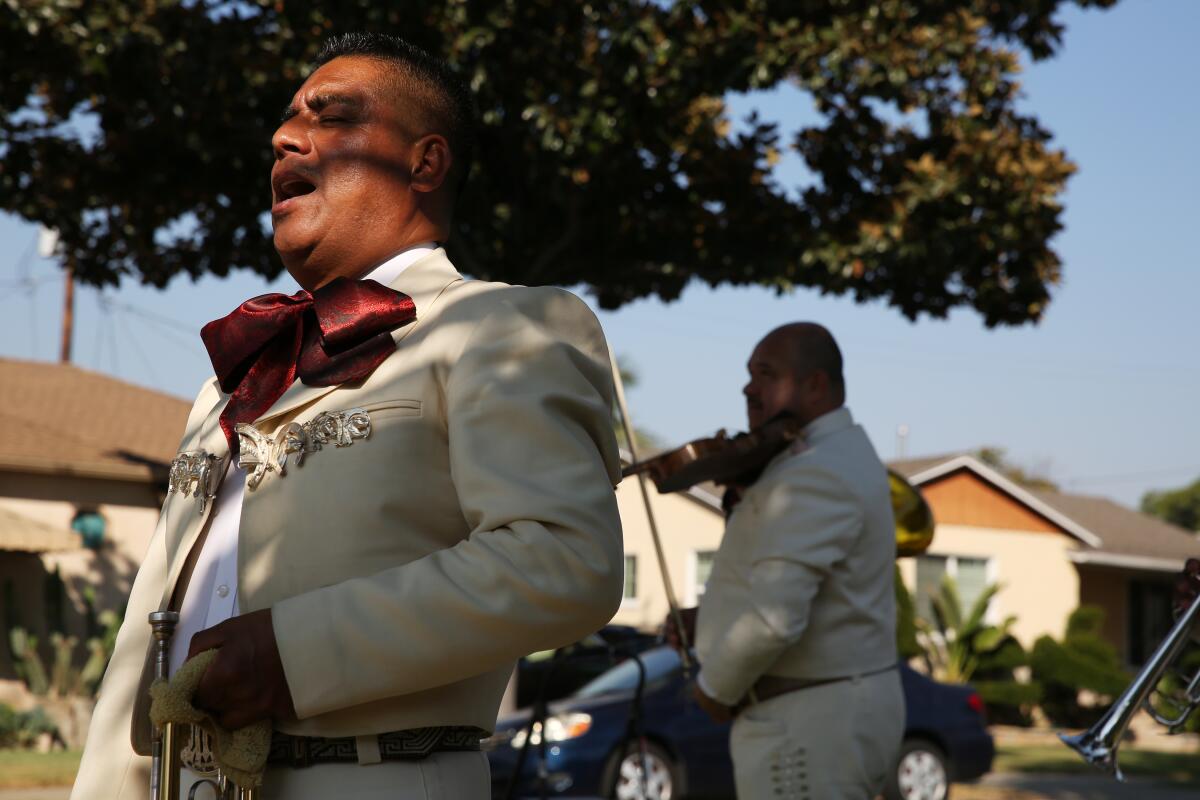
Mariachi San Antonio played off to the side, as air horns and car honks served as a chorus. Those of us closer to Grandma announced who had just cruised by.
That was Rudy, el de Santos, who works as an engineer. That was Nini, my sister, with her boyfriend, Conrad. That was Meño in the jacked-up Ford Excursion, with his kids. And was that Grace, daughter of my Tia Paulita, or Veronica of my Tío Jesus?
It was a tribute to a life well-lived, and one that would’ve been impossible during normal times.
Pre-pandemic, we would’ve probably rented a huge salon — the Industry Hills Expo Center, maybe, or the La Puente Handball Club — to mark Grandma’s birthday with a giant fiesta for her. But what we hosted for Grandma that Saturday wasn’t just a commemoration of her rich life, but also of us.
**
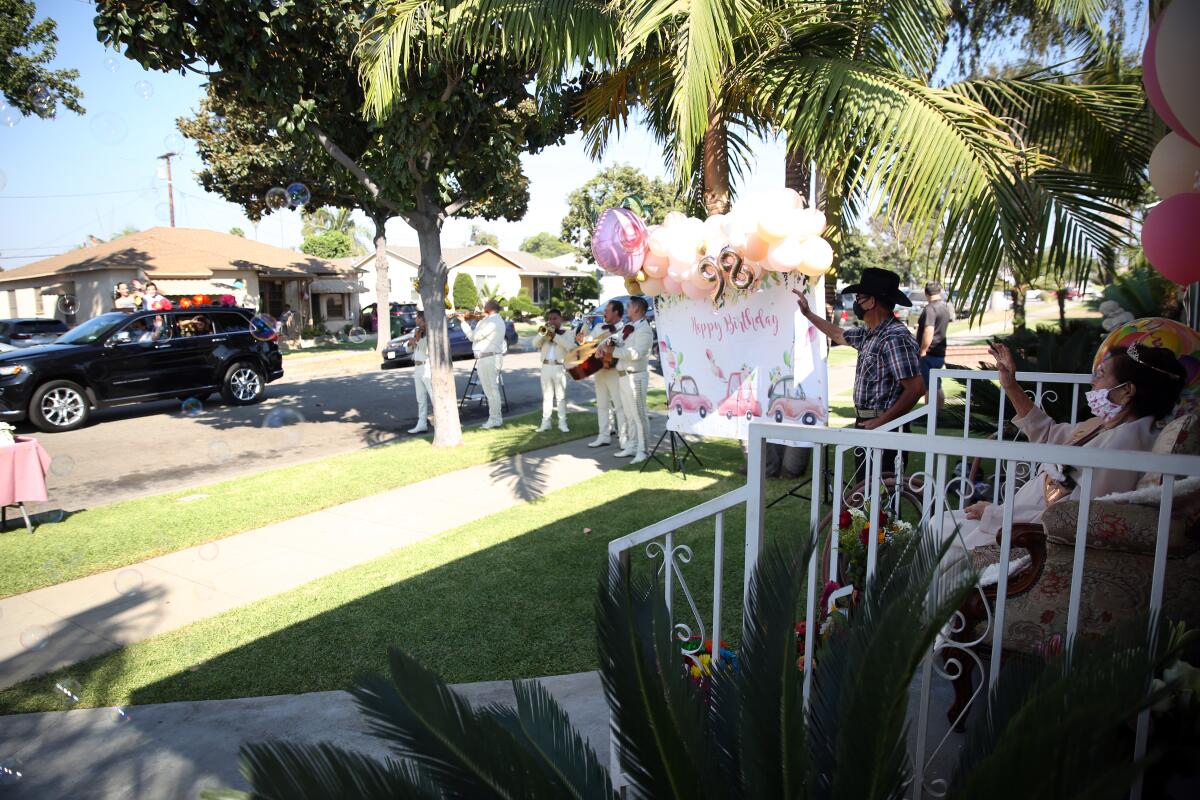
Grandma was born in 1922 in the dusty village of Jomulquillo, Zacatecas. She and my grandpa Jose — universally known as Pepe — raised eight children, all whom slowly peeled off to the United States once they became of age.
In 1972, my grandparents joined them in East Los Angeles, where seemingly half of Jomulquillo already lived.
Grandma worked as a seamstress, a babysitter and a caretaker for older neighbors. After my Pepe died of a heart attack in 1985, she threw herself toward taking care of her family. Grandma became legendary for her great cooking, her devout faith — she’s a longtime parishioner at St. Alphonsus in East L.A. — and plainspoken smarts.
One time, when we celebrated my Tio Santos’ 70th birthday, Grandma told everyone we should get pizzas to accompany the sumptuous buffet of moles and carne asada that cost my uncles hundreds of dollars. Her great-grandchildren and great-great-grandchildren might not care for Mexican food, Grandma argued.
We scoffed, but went with her advice. The pizza was gone within minutes, consumed by young and old alike.
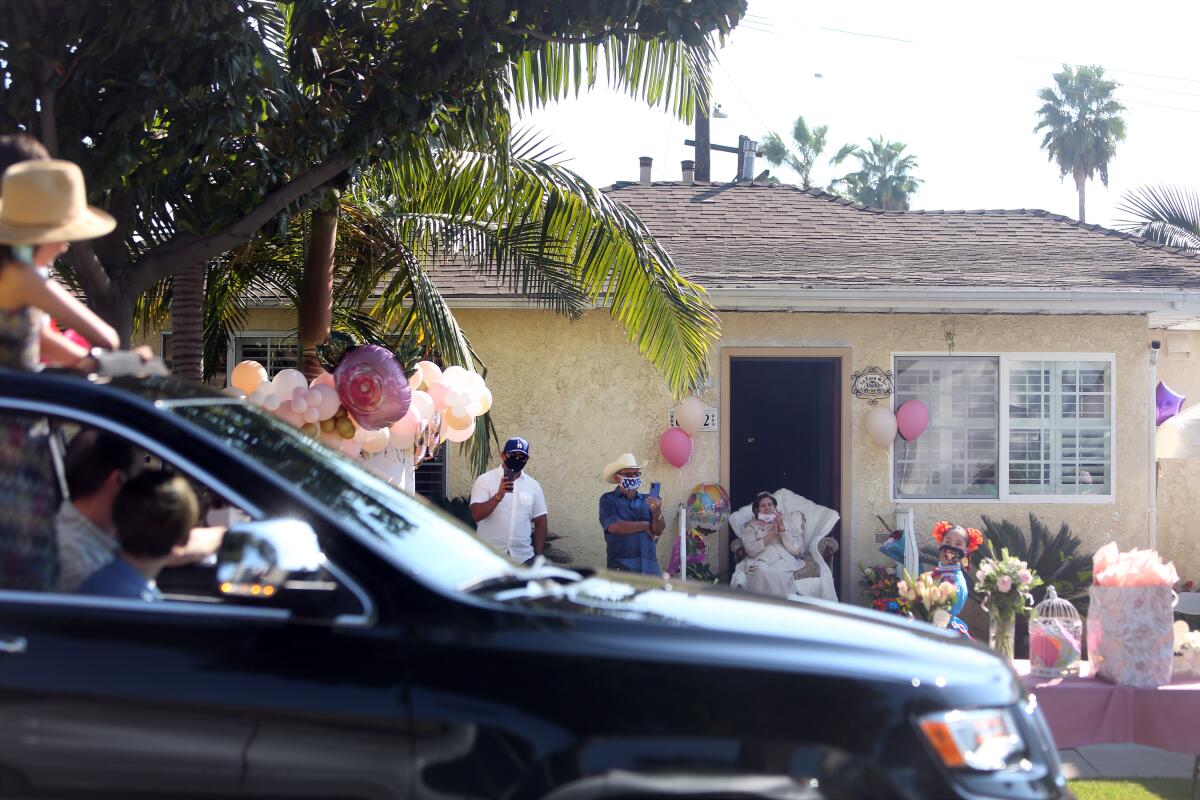
But 2020 has been a terrible year for Grandma, like so many of our elderly. She was used to daily check-ins from cousins and others from Jomulquillo; because of coronavirus, my aunts limited visits to only from the outside, and only my aunts and uncles. Dozens of cousins organized a surprise Zoom call for Mother’s Day, which lifted her spirits.
But we began to worry for Grandma, who became depressed. And then came the hospital visits.
Over the summer, she fell and broke a vertebra. Doctors decided against surgery due to her age and the coronavirus, and sent Grandma home to heal. She fainted twice due to the pain and a bad reaction to antibiotics, which necessitated more trips to the emergency room.
At one point, Grandma even told her children to visit her in person for a final blessing.
Now, she radiated with love.
“I call her la mujer valiente,” my dad said. The brave woman.
“I haven’t seen her so happy in so long,” said my cousin Ramiro, who lives with her. “She’s finally herself again.”
It was a reminder that while coronavirus is deadly, social isolation can be even worse.
**
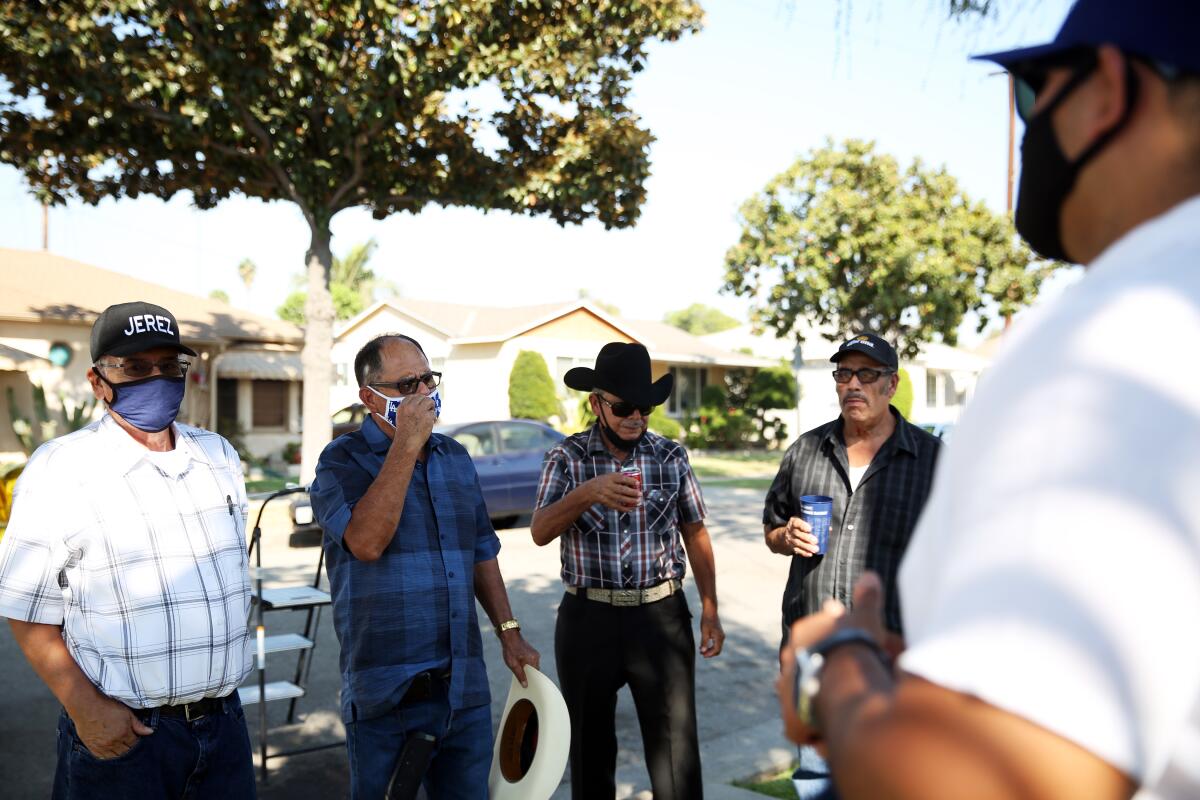
The primo parade looped around a couple of times, as the party grew in front of us. Chabelita, daughter of my cousin Leti, swirled in her baile folkorico dress. Maribel and her sons handed out to-go kits from Tony’s Deli in Montebello — a ham-and-cheese sandwich and some chips — and a bag of delicious bizcochito cookies prepared by my Tia Paulita for the cousins who didn’t want to stick around because, you know, coronavirus.
Those who stayed around parked and staked out a sidewalk for their coronavirus pod. Modelos were passed around. Dodgers and Raiders facemasks ruled.
Ramon Arellano, son of my Tio Gabriel, drove from Las Vegas with most of his kids.
“She’s always been the kindest woman,” he said. “Look all around us, cousin! It’s like the family tree that people look for. Well, we live it.”
A couple of houses down from Ramon, Araceli Arellano Hager hung out with her three children and husband, Richard. “In my family, we can’t do something like this,” he deadpanned. “There’s six of us.”
Across the street, my Tio Santos said that one of my uncles was notorious for wanting to shake hands or hug. “Right now isn’t the time to hug,” he said. “All that we can do right now is a fist-bump or a nalgazo” — a booty bump, which he acted out to the howls of my cousins.
But not everyone seemed as vigilant around the virus.
“Es show, this coronavirus” said someone, whose name I won’t mention as to spare them embarrassment in a national publication, and a rebuke from Grandma. “They [health experts] put too much cream on those tacos.”
“Ask Angie,” shot back Macario Gurrola, husband of my cousin, who’s the daughter of my Tia Nacha and works in the health industry. He rattled off friends and relatives who had died from coronavirus. “It’s an invisible enemy.”
“My compadre got it, too,” added another cousin.
The skeptic quieted. My Tio Santos lightened the mood. “Look at my mom! She looks like la Queen Elizabeth!”
I finally went to interview the belle of this ball.
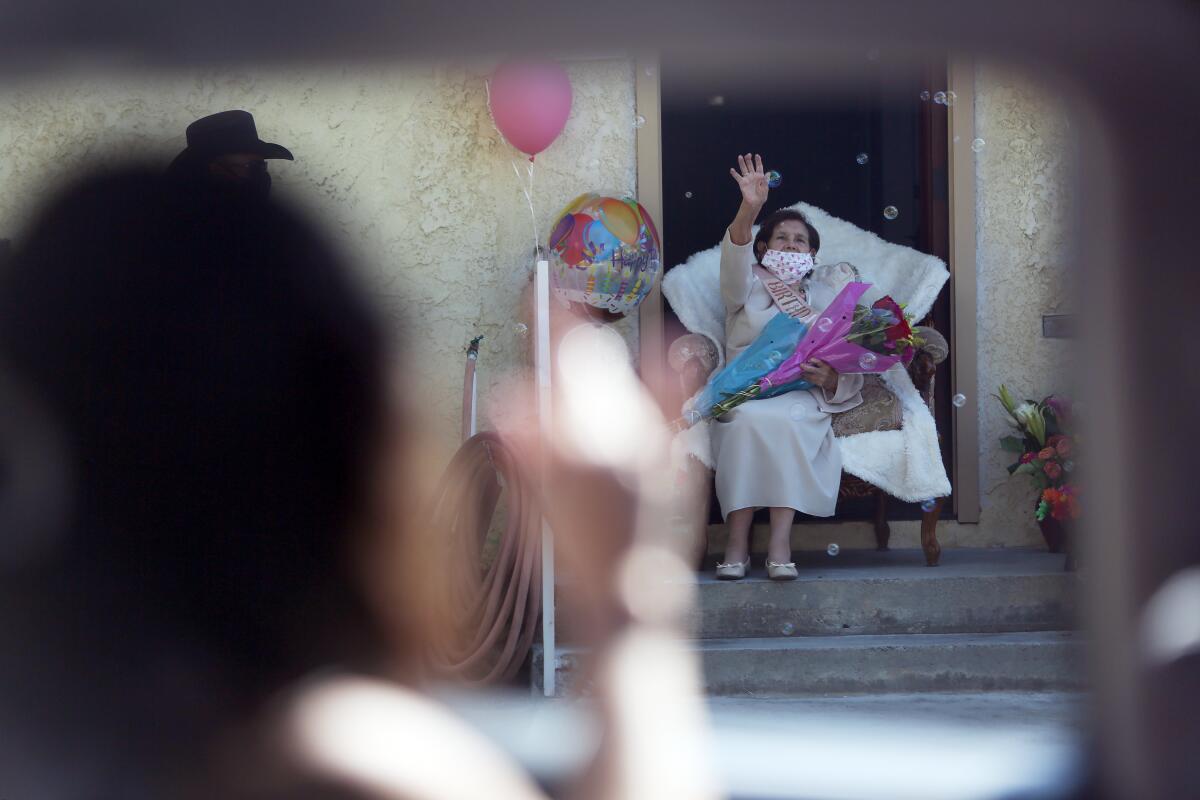
“I’m so happy!” she said. “Even though they were in a car, I was able to wave to all my family.”
Grandma credited her long life to faith, family, and good genes — three of her siblings made it to their late 90s. “I try to read as much as possible,” she said, “because the doctor says that helps me keep sharp.”
She also tries to eat as much homemade food as possible, with an occasional cheat day for In-N-Out.
Araceli danced with her mom, my Tia Chayo. The cousins that stayed began to approach Grandma to take socially distant photos to put up on Instagram. But my Grandma had one question for me.
“Is it true,” she said, “that Donald Trump got the coronavirus?”
Yep. And his Rose Garden gathering for Judge Amy Coney Barrett turned out to be a super-spreader event. Ours didn’t.
More to Read
Sign up for Essential California
The most important California stories and recommendations in your inbox every morning.
You may occasionally receive promotional content from the Los Angeles Times.

